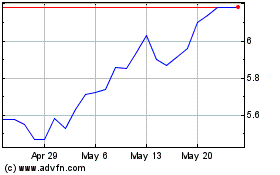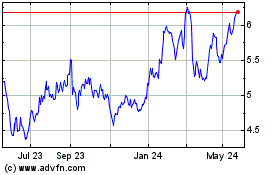Rio Tinto Scales Back Iron Ore Guidance -- Update
July 17 2017 - 8:39PM
Dow Jones News
By Robb M. Stewart
MELBOURNE, Australia--Rio Tinto PLC (RIO) scaled back its export
guidance for iron ore after production in the first half of the
year was disrupted by wet weather and rail maintenance.
The mining company also lowered its annual production target for
steelmaking coking-coal in the wake of Cyclone Debbie, which struck
eastern Australia in March and brought heavy rains and flooding,
but maintained production guidance for its other commodities,
including for copper which was scaled back in April.
Iron-ore shipments from Australia's west coast are now expected
to be about 330 million metric tons in 2017, the bottom of a
previous target of up to 340 million for the year, the London-based
miner said Tuesday.
Shipments had been impacted by an acceleration of a rail
maintenance program following poor weather in the first quarter,
Chief Executive Jean-Sebastien Jacques said.
Across Rio Tinto's operations in the remote Pilbara region,
shipments declined 6% year-over-year to 77.7 million tons in the
three months through June and were down 3% for the first half of
2017. The Anglo-Australian company's share of output from its mines
slipped 2% on a year earlier to 65 million metric tons for the
quarter and was down by a similar level for the half year.
The result from the Pilbara operations was weaker than expected,
although RBC Capital Markets analyst Paul Hissey said he remained
confident the company could achieve its revised export guidance
even with further rail maintenance planned for the remainder of the
year.
Iron ore was the biggest driver of Rio Tinto's earnings last
year, helped by a recovery in the price of the steel-making
ingredient.
The effects of Cyclone Debbie on Australia's eastern Queensland
state continued to restrain hard coking coal production in the
second quarter, with pit access at the Hail Creek operation
restricted by water, Rio Tinto said. Three-month production of hard
coking coal was down 14% on-year to 1.56 million tons and was 17%
lower for the half year. Rio Tinto said it now expected coking coal
output for the year to be between 7.2 million and 7.8 million tons,
against a 7.8 million-8.4 million ton range previously.
Mined copper production rebounded in the second quarter,
although it was still down year-on-year, as the jointly-owned
Escondida mine in Chile recovered from a 43-day strike. Overall
mined copper output was down 6% on the same period last year at
124,700 tons, and down 21% for the first half at 208,900 tons, but
Rio Tinto said it continued to expect its share of production from
operations would be 500,00-550,000 tons for 2017.
Among Rio Tinto's other commodities, aluminum production for the
second quarter was 1% lower on-year at 888,000 tons, but bauxite
output was 7% higher at a record 12.87 million tons, and semi-soft
and thermal coal production was 7% higher at 5.57 million tons.
Late last month, Rio Tinto again backed an offer from Yancoal
Australia Ltd. (YAL.AU) for its Australian coal business, Coal
& Allied Industries Ltd., after the China-backed company raised
its bid to US$2.69 billion to top a rival offer from Glencore PLC
(GLEN.LN). Rio Tinto's shareholders have voted overwhelming to
support Yancoal's bid, and the company said it expects the deal to
complete by the end of September.
Write to Robb M. Stewart at robb.stewart@wsj.com
(END) Dow Jones Newswires
July 17, 2017 21:24 ET (01:24 GMT)
Copyright (c) 2017 Dow Jones & Company, Inc.
Yancoal Australia (ASX:YAL)
Historical Stock Chart
From Jan 2025 to Feb 2025

Yancoal Australia (ASX:YAL)
Historical Stock Chart
From Feb 2024 to Feb 2025
